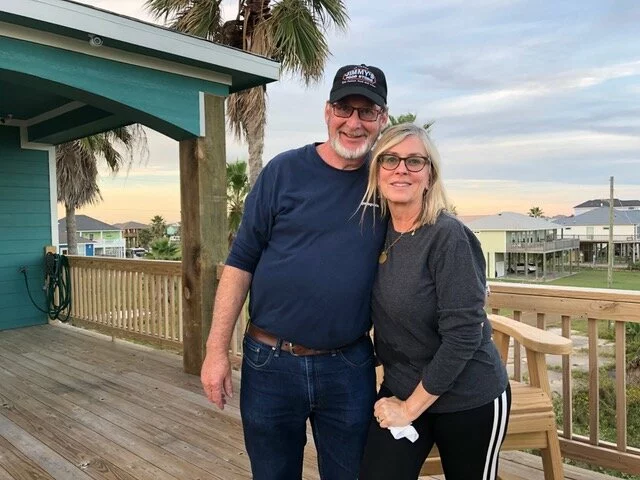Years ago, Louwane Courtney volunteered with a small adult education program in the Dallas, Texas, area. She loved it, but life got busy with kids and work, and her time for volunteer hours got lost in the shuffle.
This past January, Louwane found her way back to volunteering and registered for the remote volunteer training offered by ProLiteracy member program Aspire. And this time, she inspired her husband Mark Courtney to volunteer with her.
“Volunteering … I always felt like it was something I needed to do. I like to teach. I don’t have a teaching certificate—I am not a teacher—so it gives me the opportunity to do something I really like to do, which is to teach,” Louwane said.
Louwane and Mark are both attorneys and own their own practice. With their two kids grown, they have more time and they each spend a couple hours every week leading English as a second language classes for Aspire over Zoom. Louwane teaches a Level 3 class and Mark a Level 2. Both have co-teachers.
But, they said, volunteering doesn’t mean that you show up to class and start talking. A lot of preparation goes into each class. From reviewing the level-appropriate lesson plans provided by Aspire to ensuring that they’ve set up their computers to be ready to go with all the lesson content and exercises behind the Zoom window. During class they often need to remind themselves to stop talking so that the students can, and they must navigate the nuances of interacting with students over a computer.
For Mark and Louwane, however, the prep work seems to pale in comparison to what it takes for many of their students to attend class—in the evenings after work while juggling family obligations. Mark started with 10 students and now meets regularly with five, but he doesn’t see losing students as something he could prevent.
“I think learning a language is hard. And our students are incredible. Most only have a smartphone, and we’re looking at Zoom, online texts, different exercises in different formats. I can understand why someone would get frustrated. Or maybe their work schedules [changed]; there’s often children in the background.”
Teaching From Experience
The couple has a healthy respect for what their students are going through in their lives, living in a country where they are unable to speak the language.
About eight years ago, they sold most of their possessions and moved to France for a year without knowing any French. While their move wasn’t due to circumstances similar to what their students have encountered, the experience did give them an understanding of what it’s like to live someplace without knowing the language.
“One thing I remember distinctly is how disorienting it is to hear an announcement over a loud speaker,” Mark recalled. “I’m in a hardware store, I can’t speak the language … and there’s this big announcement and everyone begins to leave. I don’t know if the building is burning down, if there’s a gas leak? Well, it turns out it was noon, and regardless of where you are in your shopping you just push your cart somewhere and leave for two hours because they’re closed from 12–2 every day [for lunch].
“So, imagine our students being somewhere and hearing an announcement and not knowing is this an emergency? Or is there a sale on apples? You have no idea [if you don’t speak the language],” he said.
The Real Heroes
Mark and Louwane can help students understand and navigate the uncertainties they encounter in the United States by helping them learn the language. They want to give their students the skills to talk to their children’s teachers, interact with the health care system, navigate the grocery store, and all the other things native speakers often take for granted.
“You’ve got this group of people looking at you, and they need help,” Louwane said. “It turns a switch in your body as a human to see people who clearly need your help and to be able to help them. I don’t know anything more rewarding than to be a teacher.”
The reward flows both ways. For their students, it’s gaining the ability to start over and thrive in their new country. For Mark and Louwane, it’s knowing they had a part in that.
“Let me tell you. Teaching adults is a total pleasure,” Louwane said. “Especially English as a second language, because they are eager, they are motivated … these people are my heroes. The teachers are not the heroes because they’re volunteering. The students are the heroes. They are so courageous. They already left everything that’s familiar to them. Under difficult circumstances they left their families, … their homes, their language, their country, their traditions. Everything they know. And now they have to start over, and so what an experience for me to help them figure out how to be, and exist, and live in this place.”
You can learn about adult education volunteer opportunities in your community at https://www.nld.org/
